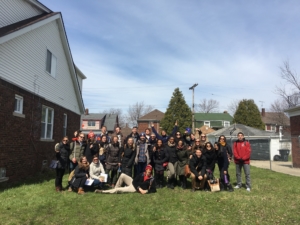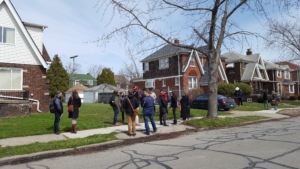This blog was written by current fellows and project coordinations leads Imani Mchunu and Christopher Johnstone.
 For five weeks this spring, we had the pleasure of serving as Project Coordination Leads for the Challenge Detroit Land Use project with the Detroit Future City (DFC) Implementation Office and Black Family Development Inc. We oversaw the project timelines of six teams of Challenge Detroit fellows as they worked for five weeks around various land use topics in the Osborn neighborhood of Detroit. These topics include an ambassador network of individuals who have transformed side lots in their neighborhood to provide ideas and support for others interested; a funding guide to bring the dream of transforming a lot into fruition; the actual utilization of the DFC Field Guide to Working with Lots to transform a lot on Rolyat Street in Osborn; a prioritization report and strategy to enhance the Safe Routes to Schools program in the neighborhood; an Osborn neighborhood branding strategy; and lastly, a tool lending and sharing program for people interested in borrowing tools for individual or group projects. The Challenge Detroit fellows utilized the design thinking method (empathize, define, ideate, prototype, and test) to answer the following challenge design question: “How might we strategically use side lots as a component of a larger open space strategy to promote future land development at the neighborhood level?”
For five weeks this spring, we had the pleasure of serving as Project Coordination Leads for the Challenge Detroit Land Use project with the Detroit Future City (DFC) Implementation Office and Black Family Development Inc. We oversaw the project timelines of six teams of Challenge Detroit fellows as they worked for five weeks around various land use topics in the Osborn neighborhood of Detroit. These topics include an ambassador network of individuals who have transformed side lots in their neighborhood to provide ideas and support for others interested; a funding guide to bring the dream of transforming a lot into fruition; the actual utilization of the DFC Field Guide to Working with Lots to transform a lot on Rolyat Street in Osborn; a prioritization report and strategy to enhance the Safe Routes to Schools program in the neighborhood; an Osborn neighborhood branding strategy; and lastly, a tool lending and sharing program for people interested in borrowing tools for individual or group projects. The Challenge Detroit fellows utilized the design thinking method (empathize, define, ideate, prototype, and test) to answer the following challenge design question: “How might we strategically use side lots as a component of a larger open space strategy to promote future land development at the neighborhood level?”
 As Project Coordination Leads for this project, we learned a great deal about how to effectively communicate with a group of 29 fellows while balancing different working styles to keep everyone on track and working toward the common goal of providing recommendations to both the DFC Implementation Office and BFDI around neighborhood land use. The six teams realized early on in the project that the Osborn neighborhood has a strong sense of pride and identity, allowing the teams to tap into that energy and excitement for neighborhood initiatives already present in Osborn. Our hope as Challenge Detroit Fellows is that we can acknowledge and feed off of the current programs and initiatives while providing new perspectives and easily implementable recommendations. The Safe Routes to School initiative in Osborn along with the Field Guide to Working with Lots address the challenges caused by blight in the City of Detroit by giving residents the tools they need to take ownership of their communities by becoming ambassadors for the safety and the beautification of their neighborhood.
As Project Coordination Leads for this project, we learned a great deal about how to effectively communicate with a group of 29 fellows while balancing different working styles to keep everyone on track and working toward the common goal of providing recommendations to both the DFC Implementation Office and BFDI around neighborhood land use. The six teams realized early on in the project that the Osborn neighborhood has a strong sense of pride and identity, allowing the teams to tap into that energy and excitement for neighborhood initiatives already present in Osborn. Our hope as Challenge Detroit Fellows is that we can acknowledge and feed off of the current programs and initiatives while providing new perspectives and easily implementable recommendations. The Safe Routes to School initiative in Osborn along with the Field Guide to Working with Lots address the challenges caused by blight in the City of Detroit by giving residents the tools they need to take ownership of their communities by becoming ambassadors for the safety and the beautification of their neighborhood.
We experienced a true collaborative effort between three organizations working together to identify how they could maximize the Fellows’ skillsets while fulfilling the needs within each organization. The process required all of us in the room to listen actively to each other to ensure that our challenges could be addressed within the given timeline while also fitting into the Challenge Detroit designing thinking framework.
To see our design and implementation team’s hard work check out this video.
